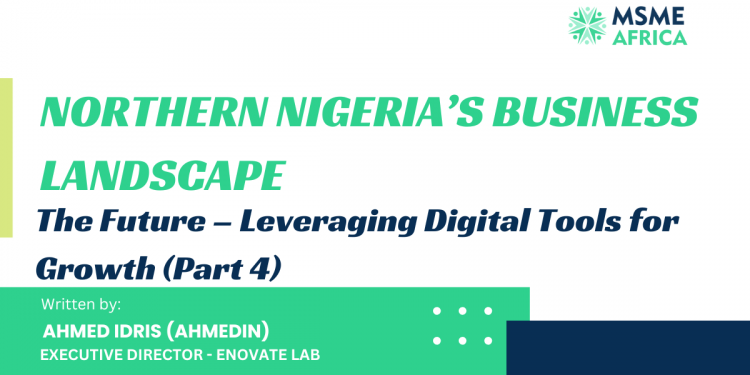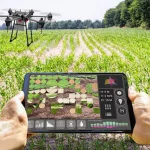In a sunbaked field outside Zaria, a farmer checks his smartphone for real-time soil moisture data. Nearby, a solar-powered cold storage unit hums quietly, preserving tomatoes that would have previously spoiled before reaching the market. These scenes offer a glimpse into Northern Nigeria’s digital future—one where technology bridges historical gaps in infrastructure and access. But will the region seize this potential, or watch another economic revolution pass it by?
Agri-Tech: Farming 2.0
A quiet digital revolution is transforming farmlands across Nigeria’s northern regions, turning smartphones into essential farming tools and data into valuable crops. The $1 billion agri-tech potential here hinges on three disruptive innovations: satellite-guided irrigation systems that reduce water use by 30% in drought-prone areas, blockchain platforms bringing unprecedented transparency to grain supply chains, and digital marketplaces already connecting over 500,000 smallholder farmers directly to buyers. According to World Bank projections, these technologies could boost farmer incomes by 40% while combating the fraud that plagues agricultural trade. ‘Five years ago, I depended on middlemen who cheated me—now my phone shows fair prices and brings buyers to me,’ explains Yusuf Bello, a sorghum farmer in Jigawa using the Crop2Cash app to secure advance payments for his harvest. As Northern Nigeria’s agricultural sector embraces these tools, it’s not just yields that are rising—but the entire value chain’s potential.
Energy: Powering the Digital Leap
The digital transformation of Nigeria’s northern regions faces an electrification roadblock—70% of small businesses still depend on costly, polluting generators to stay operational. This energy gap is now being bridged by innovative renewable solutions tailored to local realities: solar microgrid projects like the REA/KEDCO initiative are bringing reliable power to rural communities, while pay-as-you-go systems from companies like SunKing allow households and SMEs to access solar energy through affordable weekly payments. The potential impact mirrors successes seen elsewhere—in India’s arid Rajasthan region, combining digital tools with reliable renewable energy boosted agricultural yields by 28%, demonstrating how energy access and technological adoption work hand-in-hand to drive development. For northern Nigeria’s tech hubs and agribusinesses, solving the energy challenge could unlock the full potential of their digital ambitions, creating a virtuous cycle of productivity and growth.
Building the Ecosystem
Transforming northern Nigeria into a digital economy requires coordinated action across sectors. The government must prioritize infrastructure and incentives—implementing tax holidays for tech parks in cities like Kano, Jos, and Minna while fast-tracking broadband rollout to all state capitals by 2030. Simultaneously, private sector players need to step up investment in the region, establishing northern-focused venture capital funds and forming strategic partnerships with local tech hubs that have already demonstrated success—Enovate Lab’s alumni, for instance, now contribute their skills in countries like Qatar, Belgium and Germany. This dual approach of public-sector enablement and private-sector engagement could create the fertile ground needed for homegrown innovation to flourish, keeping talent and value within the region rather than watching it migrate south or abroad.
The Trailblazers
Northern Nigeria’s digital revolution is being fueled by visionary leaders who are proving what’s possible in the region. Amal Hassan, founder of Outsource Global, has built a $5 million business process outsourcing empire from Abuja that now delivers services to clients worldwide, shattering perceptions about Northern Nigeria’s global competitiveness. Meanwhile, grassroots initiatives like the Code Pyramid tech community are cultivating homegrown talent—since 2016, they’ve trained over 5,000 developers, with 15% landing prestigious international positions while maintaining ties to their Northern roots. These trailblazers demonstrate that Northern Nigeria possesses both the talent and ambition to compete on the global digital stage; their success stories are inspiring a new generation to build transformative businesses without feeling compelled to relocate to Lagos or abroad
A Fork in the Road
The coming decade presents two starkly different futures for this region. By 2030, it could emerge as Africa’s next agri-tech powerhouse, where satellite-guided farms and digital supply chains revolutionize agricultural productivity. Or it might remain trapped in subsistence farming cycles, watching as other regions leap ahead. According to PwC Nigeria, this pivotal difference hinges on securing $300 million in targeted technology investments today—a relatively modest sum that could determine whether the area becomes a breadbasket or stays dependent on rain-fed crops. The choice isn’t merely about agriculture, but about securing economic relevance in an increasingly digital world.
Series Conclusion
This brings us to a defining moment – one that could reshape the region’s economic destiny for generations. The digital revolution presents a rare opportunity to leapfrog persistent infrastructure gaps and systemic challenges that have held back progress for decades. While the roadmaps and solutions exist – evidenced by pioneering efforts across agri-tech, renewable energy and fintech – realization now hinges on decisive, coordinated action. The missing piece isn’t vision or technology, but collective willpower: the courage to invest meaningfully, implement policies consistently, and sustain efforts beyond political cycles. As the examples in this series demonstrate, the ingredients for transformation exist; what’s needed now is the recipe for execution.










